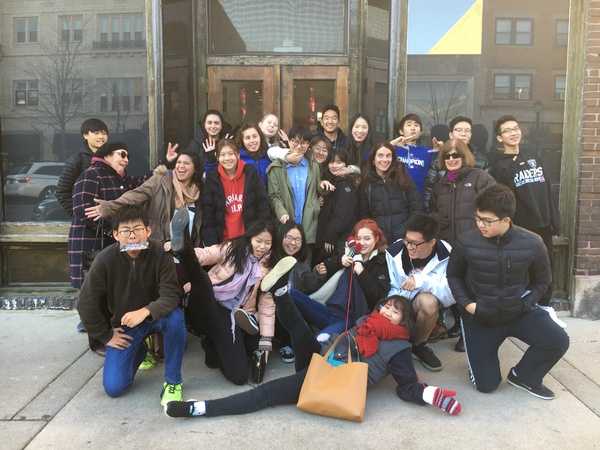ESL smooths transition to new country and New Trier
Program helps integrate students from 11 different countries into school

Yoon
ESL students posed for a group picture in 2017 after seeing a play and having lunch in the community
Once a student is determined to be an ELL, they are given schedules that integrate the appropriate ESL and mainstream courses, tutors/in-class aides if necessary, and communication between families and the school through parent support groups and ESL College Night programs.
Senior Yoo Jung Yoon moved with her family to the United States in August 2016 from South Korea, and she can still distinctly recall the anxiety she felt on her first day of school at New Trier.
This experience was a reality for the 25 English Language Learners (ELL) in our school’s English as a Second Language (ESL) Program, who moved from 11 different countries spanning all corners of the world to become students at our school.
Yoon remembers feeling lost in the midst of a close knit student body.
“A lot of people here have been friends since junior high. When I first walked into my sophomore advisery, I was surprised because everyone seemed to know each other and it was hard for me.”
When an ESL student is introduced to the school system, they are immediately flagged and tested for English proficiency to be placed in a range of ELL classes or mainstream classes.
For Touchanon Thammavijitdej, a senior who moved from Thailand May of 2016, his largest struggle was his limited ability to communicate with his peers.
“When I moved, I didn’t have a lot of English skills,” he said.
Similarly, sophomore Ekaterina Sukhotskaya, who moved from Moscow, Russia in July 2017, said that overcoming the language barrier and adjusting to student life at New Trier was a difficult change to make.
However, she expressed gratitude towards her teachers in the ESL Program.
“My teachers have been very helpful and whenever I’m confused, they try to explain things and find information for me. They go slowly when they explain concepts to me and use simple English,” said Sukhotskaya
The predominant struggle ELLs face during their transition into English speaking classes is keeping up with the speed of native English speakers and learning a new set of vocabulary.
“I still struggle with speaking and it’s hard for me to compete with other American kids. Sometimes I get nervous to participate in class, but I just try to confident,” said Thammavijitdej.
This difficulty with vocabulary persisted for Sukhotskaya even in her math class. On her first geometry test of the year, she received a bad grade because she had been unable to keep up with her teacher’s explanation of critical concepts.
Despite this setback, Sukhotskaya refused to give up and went in to see her teacher multiple times before the next test to make sure she performed to her full potential, and she ultimately received the grade she wanted on the next test.
Yoon expressed similar sentiments, “Even though I may be comfortable with math, solving word problems was especially hard for me. Especially in science and history, a lot of the vocabulary is hard to understand.”
It’s also difficult for many students to ask for help while overcoming the language barrier, “There are a few students in ESL 1 and ESL 2 who have advisers who don’t really help them and because we, the people in ESL 3, understand their struggle, we try to help them. But a lot of these younger students push away from our help because they feel uncomfortable accepting it,” said Yoon.
Although these three students may have come from three separate countries, a common thread among them is their resilience and willingness to learn in their new environment.
Despite a formidable language barrier, the ELLs have fought to adapt to a new culture and curriculum. The ESL Program offers a variety of services to help ease ELLs and their families into the American school system, but this transition is undeniably difficult and should not be underestimated by other students.
“There are so many things I wouldn’t understand if I had to take regular classes right when I moved here, and I’m really glad to be a part of the ESL Program. I wish teachers and students could be more understanding because we’re trying our best and many Americans would also struggle if they were in our place,” said Yoon.








































